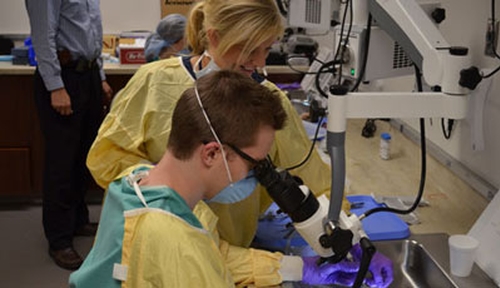It's been a big spring for ribbon cuttings, groundbreakings and tributes at UNMC. Buildings — proposed, newly open and about to come down — have taken the headlines.
But while those patient-care initiatives took center stage, the otolaryngology (head and neck surgery) department opened its new, education-focused bone lab – a larger, state-of-the-art facility that otolaryngology (ENT) residents are comparing favorably with labs anywhere else in the country.
Dwight Jones, M.D., professor and chairman, otolaryngology-head and neck surgery, said the new lab puts both the otolaryngology and neurosurgical departments on the national map for quality resident and faculty education.
"This lab will help us recruit quality otolaryngological and neurosurgical residents," Dr. Jones said.
Gary Moore, M.D., professor, otolaryngology-head and neck surgery, began trying to raise funds for a new space about two-and-a-half years ago. Last week, he was watching as the first group of ENT residents used the new lab to practice procedures that will one day save the hearing — or lives — of the patients they treat.
"This offers residents hands-on education," Dr. Moore said, watching on a mounted video screen as Jonathan Hatch, M.D., a third-year resident, performed a delicate procedure on a temporal bone, the part of skull that contains the ear. "It also allows us to train more people, as well as draw residents from other educational programs."
Dr. Moore recognized Carol Lomneth, Ph.D., genetics cell biology and anatomy, for her contributions to the program.
The new lab offers roughly three times the space of the old one, with 10 microscope stations (up from two) and video screens allowing faculty to instruct residents in real time.
When new techniques, such as balloon sinuplasty, are discovered, UNMC residents now have a way to practice before performing actual surgical procedures, Dr. Jones said.
Asked to compare the new space with the old one, resident Jessica Moran-Hansen, M.D., almost laughed.
"This is 100 times better," she said. "There is no comparison between this and even other national laboratories we've been to."
The instantaneous feedback is a huge advantage, Dr. Moore said. "From an education perspective, it's much more effective."
It's also more efficient, he added. One instructor can monitor four or five residents at a time with the video screens.
The department already plans to use the lab for a regional course in the fall and a national course in 2014.
"We now have all the equipment and facilities to do a national-level course," Dr. Jones said. "This is about educating residents to become quality surgeons."
